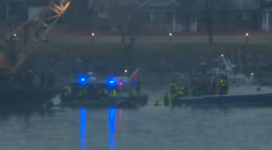RUWEISHED, Jordan – With signs of the fall of Saddam Hussein’s regime, Iraqis take to streets celebrating, welcoming U.S. troops, looting while Marines help crowds topple the statue of Saddam. Humanitarian and Christian Aid agencies believe now is the most urgent time to reach out the Iraqis.
“We think it is vital for God's people to help with these helping ministries and not just leave it for secular agencies," says John Brady, who coordinates the work of the International Mission Board in the Middle East and North Africa. "Surely God wants to be in the midst of helping these people. That means we as His body, His people must be in the midst of helping these people."
The International Mission Board was among the many ministries that helped the United Nations in setting up tents for refugees from Iraq. Though those tents stood empty, the second camp set up for refugees from other countries who have fled the fighting in Iraq stood filled with hundreds of refugees.
Most refugees in the tent are from Somalia and Sudan, with some others from Egypt and the Palestinian areas who had fled war and poverty in their own countries and sought their fortune in Iraq. But war forced them to flee for their lives leaving them with little hope.
Charles Browning, a 20-year veteran of work in Jordan said he and others have stockpiled clothes, diapers, milk, formula and other supplies for babies. They also take time to talk with the people.
"What I have found in this camp is that a lot of times people just want to come up and talk. And we're able to just sit and talk with them," he says. "That's part of the Gospel of Christ -- meeting the spiritual needs as well as the physical needs.
"If you tell somebody 'Go in peace' and 'God loves you,' but you don't feed them or clothe them, then really, what does that mean to them? They just say, 'Oh, they don't care for us!'" he explains. "So by helping these areas, it starts a basis for sharing the complete Gospel to them and what we believers are about. And that is the whole person and not just one part of a specific individual."
Now, with the war drawing to an end, the agencies prepare to embrace the needs of the hundreds of thousands of displaced Iraqis. Nobody knows if or when more refugees might appear at the border, as hundreds of thousands of Iraqis did during the Gulf War more than a decade ago. Browning thinks it is possible big numbers of refugees might yet come.
A group of men from Sudan stand around, talking in an open area. They had fled the war in Sudan and went to work in Iraq, where they could at least work and make money. But when the war broke out, they fled to Jordan with nothing.
"Where will you go?" one man who speaks English is asked. "I don't know," he says sadly.
By Pauline J.
-

Pastor John Piper Offers Insight and Encouragement for First-Time Bible Readers in 2025
As the new year begins, many Christians have resolved to take on the project of reading the Bible cover to cover. That's great and all, but if it's your first time, just where do you start?
-
[Exclusive Interview] A revelation within the brink of life and death — Meg Leung’s mission in Christian art
Meg Leung (梁麗橋), an artist with a lifelong love for watercolor painting, sees her art as more than a means of expressing her inner world; it is a bridge connecting her to God. Her artistic journey has revealed God’s perfect plan and inspired her to communicate the power of faith through her wor
-
Former President Jimmy Carter Honored with State Funeral, Grandchildren Reflect on Sunday School Legacy
Former U.S. President Jimmy Carter, remembered not only for his leadership but also for his lifelong dedication to teaching Sunday school, was laid to rest on January 9 in a solemn state funeral filled with scripture and heartfelt tributes.
-
Korean cult leader who raped victims ‘in the name of God’ sentenced to 17 years in prison
Jung Myung-seok (정명석), leader of the Korean religious cult Jesus Morning Star (JMS), also known as Christian Gospel Mission (CGM), has been sentenced to 17 years in prison by South Korea’s Supreme Court.
-
5 times fire was used in the Bible as judgment: Reflecting on the LA wildfires
The recent wildfire in Los Angeles has prompted Pastor David Zhai (翟大衞) to reflect deeply on five significant instances of fire in the Bible. Pastor Zhai, a frequent speaker and preacher at churches in the Vancouver area, often interprets current events and news from a biblical and faith-based perspective.




![Saving Gen Z’s Faith: Steve Richardson’s Bold Call to a New Generation of Missionaries [Exclusive Interview]](https://www.gospelherald.com/media/cache/thumbnail/7/21/72196sp_273w_150h_1x_1y.jpg)

